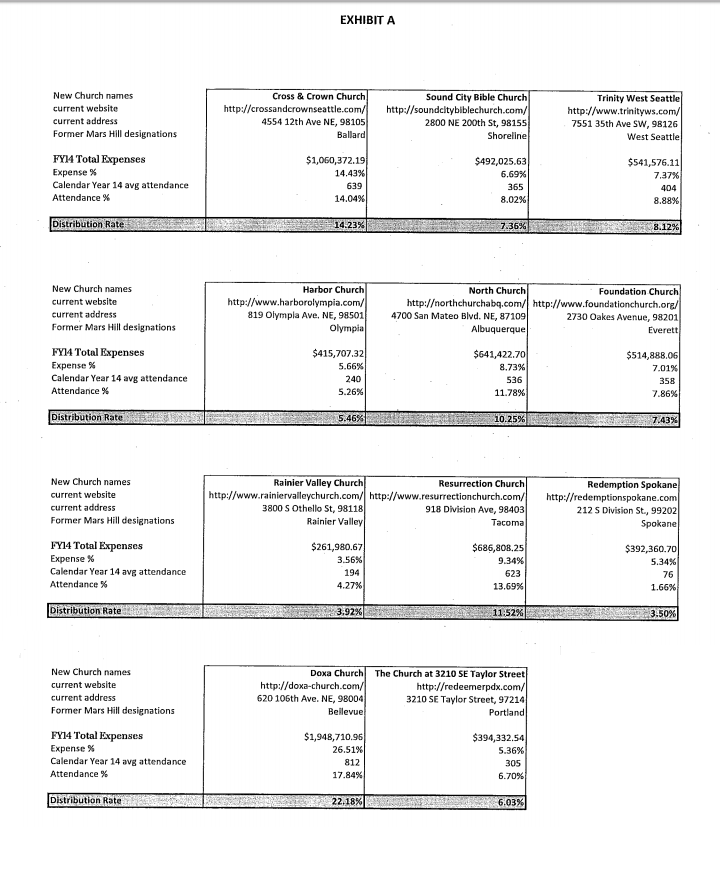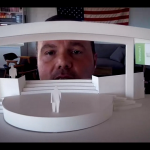In 2014, I could not get a comment from anyone at Mars Hill Church in Seattle about anything. I am sure that most of the leaders there saw me as a serious problem since I wrote so much about the church and problems in leadership there. Eventually, the church closed and distributed assets to several autonomous churches which had been part of the Mars Hill network of locations.
Sutton Turner was one of the executive pastors who presided over growth and decline of the church. Since the closing of the church, Sutton and I have had several friendly conversations about the church and his role in the situation. Because of that, I felt comfortable calling on him to discuss a recent positive move in his life.
Yesterday, I saw an announcement that Sutton has joined Vanderbloemen Search Group, a Christian job search company as Vice President of Candidate Relations. In the announcement, Mars Hill Church is mentioned but there is no direct mention of the downside of the organization. Curious, I asked Sutton some questions about what he had learned at Mars Hill. He was kind to answer them today.
Throckmorton: In the Vanderbloemen announcement, what you learned at Mars Hill is credited with fueling your passion for healthy churches. Could you expand on that?
Turner: I have 23 years of experience leading different organizations in business and ministry. I have seen the best and worst cultures. I have been a part of start-ups where I was able to create the culture and walked into cultures that I did not create but tried to improve. All leaders find themselves in these two categories today.
After Mars Hill was divided up into independent churches in 2014, I began to meet with former members and staff from Mars Hill who wanted to meet with me. I had moved to Texas, and some of these conversations first took place on the phone. I also flew back to Seattle several times at my own cost. Many people were former members before my time and Mars Hill, some were leaders that worked alongside me, and some were faithful members of the church. The deep hurt felt by these members over the loss of their church cannot be understated. It was a HUGE loss in their lives that continues today. It affected their kids, marriage, and community. Some people walked away from attending church all together from their Mars Hill experience. These face to face meeting profoundly affected me and motivated me to help avoid another Mars Hill experience in the future. I then wrote a series of blogs in 2015 to bring another perspective to what happened at Mars Hill and perhaps help others in their healing process.
Over the last year, I read William Vanderbloemen’s book “Culture Wins.” I absolutely love the focus around creating a great environment and culture of an organization. William’s company, Vanderbloemen Search Group (Vanderbloemen), has a great culture and wants to help other organizations create culture. I am grateful to be able to join a culture and company trying to help others. Vanderbloemen provides search and consulting for churches, non-profits and mission-based businesses. As I join Vanderbloemen, I hope to use all of my experience to assist other leaders and organizations. However, my first role at Vanderbloemen will be to improve the efficiency and effectiveness of their search process.
Throckmorton: Many on the outside and inside at the time have questioned the health of Mars Hill. First, do you agree that Mars Hill while you were there was not a healthy church? In what ways did that lack of health manifest itself?
Turner: I believe until we get to heaven, there will not be a “perfect church” with a “perfect culture.” All churches have areas to improve, just like all Christians have areas to improve. I loved Mars Hill and I love the people of Mars Hill Church. During my time there, I saw a faith family grow in their knowledge of the Bible, their heart for worship, and their service to others. But Mars Hill had many areas to improve that were never addressed, some of which led to its closure. Culture quickly is created by the decisions of leadership, and once the culture is created, it is very difficult to change. Culture can be changed, but it takes committed leadership to make that happen.
Since the closing of Mars Hill in 2014, I have made many trips to Seattle to meet with hurt former church members. Some members attended Mars Hill before my time. I have learned a great deal through these meetings about how their lives were affected by the church. I wrote several blogs to communicate what I have learned and help people with their healing. As I stated in 2015,
Early on in my time at Mars Hill, I unfortunately operated in a sinful way that was consistent with the existing church culture that had grown and been cultivated since the early years of the church (late 1990’s). Instead of being an agent of change for good, I simply reinforced negative sinful behavior. (I am responsible for my own actions, and do not blame my actions on the culture.)
I am planning another trip back to Seattle this fall to meet with more leaders and former members to continue the healing process. I hope to continue to learn from what happened at Mars Hill and use this experience, along with my other leadership experiences, to help churches, non-profits and mission-based businesses while at Vanderbloemen.
Throckmorton: What can you tell us about what you learned in your position at Mars Hill which can help you help others develop a healthy church?
Turner: Over the last 4 years, I have studied the culture from Mars Hill and talked extensively to people that were negatively affected by the culture and its leaders. I am building a set of material from this research to help other organizations which I have shared with several pastors and leaders. They have identified one or two of these areas they see in their own church culture that needs improvement. I hope to use my experience to help other leaders and pastors in the future while at Vanderbloemen.
Throckmorton: The growth of the church was remarkable, and yet the implosion was also remarkable. What observations can you offer about the rise and fall of Mars Hill?
Turner: Well, this is exactly the material I have been working on. Trying to research the elements of the culture of Mars Hill and see what can be learned by its dramatic rise and fall. Mars Hill started in the late 1990s. The culture was created over the decade before Pastor Dave Bruskas and I joined senior leadership. However, I fully believe that as John C. Maxwell says “everything rises and falls with leadership.” In 2015, I wrote several blogs about what I learned and stated:
I have written about my personal journey of repentance and forgiveness (Part 1 & Part 2). Many will say that Pastor Dave and I did not do enough to change the culture; which is fair and certainly true, but only those who worked within the inner circle know how hard we tried.
Right now, I continue to research and document what I have learned from the Mars Hill experience. I continue this effort to help people heal and help other leaders learn from the culture of Mars Hill. No one wants to see what happened at Mars Hill ever happen again. As a leader that was front row to the last 4 years of the church and created the plan to disband the church into independent churches, I have a good perspective to hopefully use my experience to help others.
Reflections
These are probably hard questions to answer. It is difficult to address the culture at Mars Hill without talking about Mark Driscoll. Although much water is under the bridge, Turner gives witness that there are still people who went to Mars Hill who are not over it. There is unfinished business for Driscoll to attend to in the Northwest.
On the bright side, in 2014 I never thought I would be reflecting back on Mars Hill with Sutton Turner (I have also had some nice exchanges with Dave Bruskas).
To read my posts on Mars Hill Church, see this link: Mars Hill Church
To read my posts about Mark Driscoll, see this link: Mark Driscoll
Like this article and want to see more like it? Support this blog at Patreon.com.


